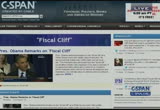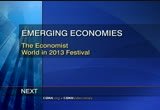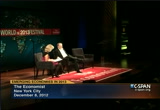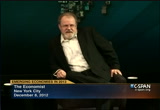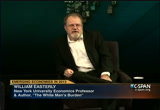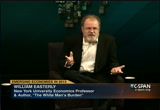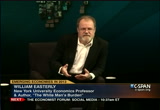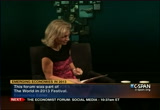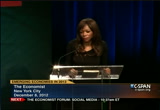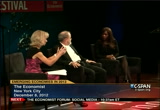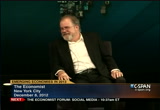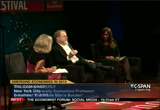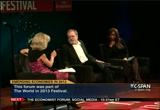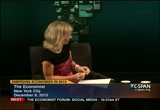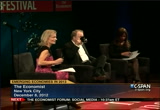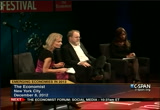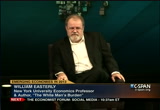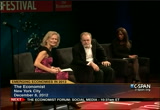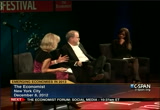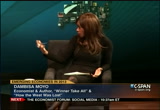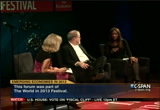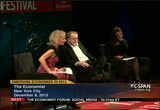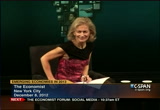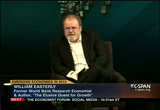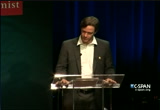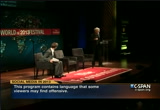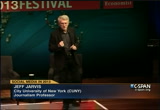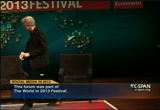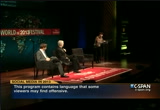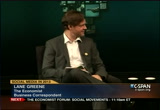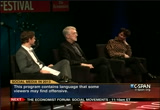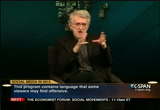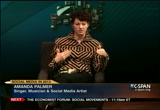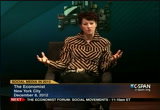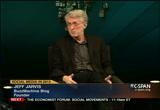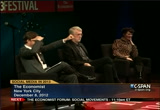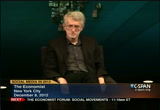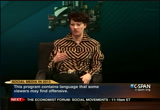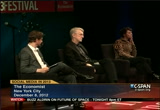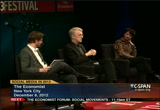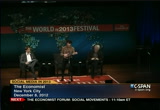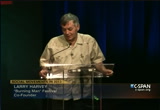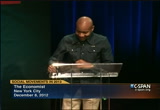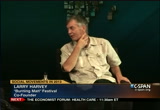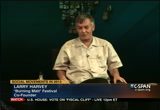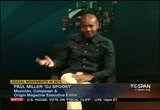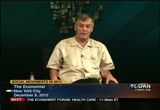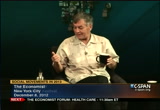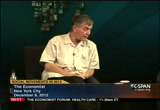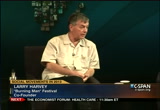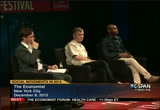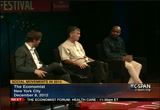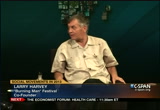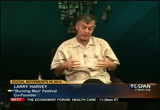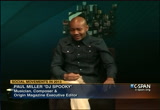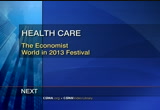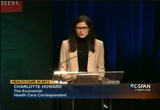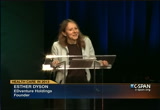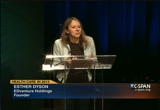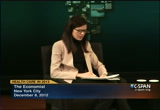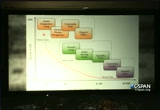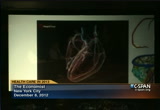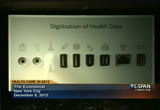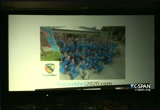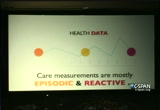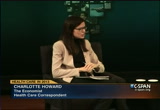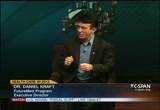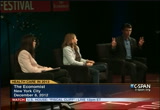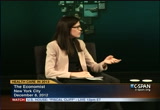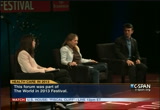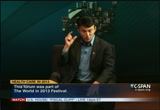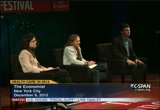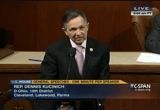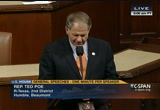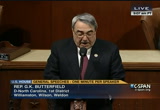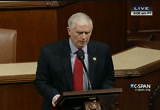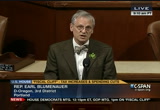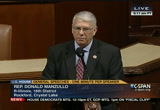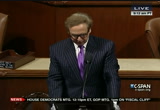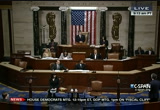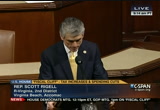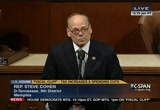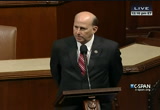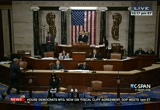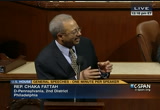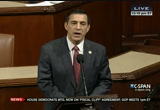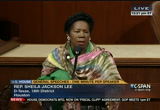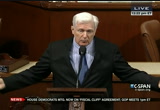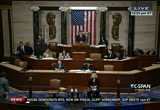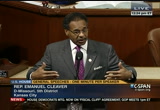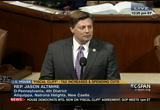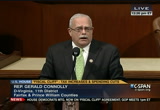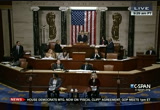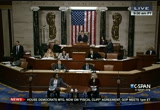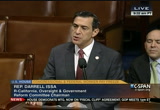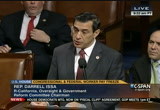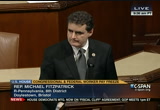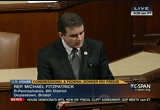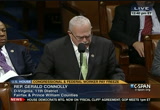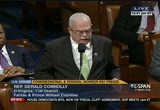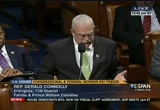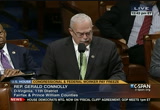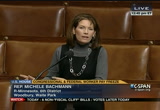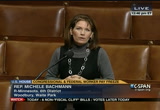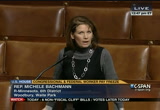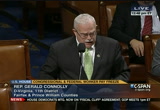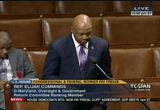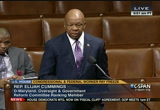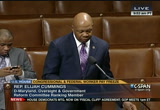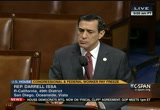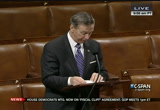tv Public Affairs CSPAN January 1, 2013 10:00am-1:00pm EST
10:00 am
host: if you want to brush up on what is happening, go to our web site, c-span.org/fiscalcliff and a twitter feed to follow along with the latest. this tweet from dog -- the senate is out of reality and cannot function. senate is the now action goes to the house. we will cover when they come in. we will continue to take your phone calls and your tweets here on c-span. thank you for watching. we will be back tomorrow morning 7:00 a.m. eastern time.
10:01 am
[captioning performed by national captioning institute] [captions copyright national cable satellite corp. 2013] >> up next is a discussion on emerging economies around the world in 2013. the house failed to vote on an agreement before last night's fiscal agreement. have live house coverage at noon eastern. now the debate on emerging economies like china and india, comparing them to the united states. william easterly debates dambisa moyo, the author of "winner take
10:02 am
all." this is 35 minutes. >> there is question about whether they can keep up and whether there is something bigger changing. that is what we will look at in this session. we have two outstanding individuals known for contrarian views on the emerging economies. we will start with william easterly and probably best known
10:03 am
to you for his books, "the white man's burden ." a very non provocative book as you can tell from the title. "the elusive quest for growth." bill was named one the top global intellectuals. [applause] what is going to happen to these bricks? guest: i want to focus on china . this is a major moment for development thinking.
10:04 am
the idea of the growth merkel that china has done so much to promote is over at this point. let me give some insights. authoritarian growth miracles do not last. how many of you have heard of a growth merkeiracale? al? just raise your hand. i thought we would have a better informed audience. you have not heard of it because it only lasted from 1960-1 975. authoritarian growth miracles do
10:05 am
not last. they won for a while -- they go on for a while. we keep thinking this chinese boom will last for a while. this boom will last for ever. it is already slowing down. why does it give us some insight? let me take a drink of water before i give you this profound insight. [applause] it was never an authoritarian with. merkeiracle begin
10:06 am
we've got the effect of economic freedom was not on the change in, but on the level of per capital income that countries attain. free countries are rich countries. dish with economic repression are poor countries. north america verses africa. that implies when you see it rapid growth, one thing that could be going on in china is you have changes predicting changes. you have a change in freedom and that change predicts a change in income. what happened in china? you had one of the worst totalitarian systems and there was an increase in freedom.
10:07 am
you had some increase in political freedom. chinese people today are much more free, even politically. this release the energy of the chinese people and you have this rapid economic growth. that is the story line that i will give you as to why the last.e merkeiracle and not >> go ahead. >> i thought that what by me extra time. i don't know how many of you heard the story. "the onion' declared north
10:08 am
korea's leader the sexiest man alive. the, as party newspaper did not raise this was a satire and reprinted it straight up. this is a little bit funny. itle bit of an bi insight into the current leadership. they would not allow this kind of satirical irreverent towards their leader. they do not recognize satire when they see it. it may seem absurd you can mistake an "onion" story for
10:09 am
a real start but they did. a fundamental flaw is you have no feedback. .hat's what is missing in china we now know that thanks to "the onion." >> i will have dambisa moyo join us. another author of several best- selling books. this year she published "winner takes all." she has been named one of the most influential people of the world by "time" magazine.
10:10 am
[applause] >> good morning. o ye of little faith. we are on the wrong side of the aid issue. i don't want to get swayed immediately. i'm here to give my prediction for 2013. the emerging of the frontier markets. they are the ones that are not in the bricks. much of eastern europe and parts of asia. why do i love this story? capital, labor, productivity.
10:11 am
let's take a look at what is happening in the western countries. you know the story. in terms of labor, there are issues. we know the story about the aging population. also in terms of quality. they measure the performance in mathematics, science, and reading and rank countries every three years. and then productivity. productivity is supposed to account for about 60% of white one country grows and another does not. how efficient we are in using
10:12 am
capital labor and rule of law, how open the business environment is. we know what is happening there. look at the frame work and applied it to the emerging markets. i am incredibly bullish for 2013 and the years ahead. places like africa -- compared to over 100% in places like greece and italy. these countries are not suffering from the leveraging problem. 60% of the emerging world is under the age of 25. over the to% in places like
10:13 am
uganda. there are issues with youth employment. we are talking about 30% increases. opportunity for economic growth. things like political improvement in terms of democracy and freedoms. i have to have this debate with you, bill. countries like rwanda have been ranked number 1 by the world bank as the most improved. then the closed by telling you this. 90% of the world's population
10:14 am
live in the emerging markets. they want to see improvements in their livelihoods. ir success is no longer hits to the global economy as a whole. there will be issues. i do think it will be bumpy. a number of countries are pivoting towards china. thank you very much. >> we have to talk about china. you cite this story about capital labor and productivity. you could say that about the bricks. they were slowed dramatically.
10:15 am
>> there is a clear delineation from the advanced emerging countries and these emerging countries. it is how integrated the bricks are and how much exposure that have. it is dependent on the united states and europe. let me pick my own continent, africa. less than 2% of foreign investments. i think there will be a lot of domestic demand. look at how things are trading in the local markets rather than being into credit to the west. >> it doesn't depend on
10:16 am
commodity prices? >> it is not entirely the case. today there are about 1000 stocks that trade in africa. if people look at africa, they are missing out on one of the biggest trades that is occurring. at the performance of the markets in nigeria and kenya. they are among the best performers driven by the banks in terms of economic development. story has been replicated in ilri lanka.rill won >> we know that china is
10:17 am
slowing. i do not think it is a hard landing. they are managing themselves out now. china is the biggest buyer of these raw commodities. .> let's focus on china they are the biggest and most important of the emerging markets. i 8 cents determinism in your view -- i sense determinism in your view. to break up the domestic monopoly. do you think they cannot do that? >> i think you cannot do it unless there is political
10:18 am
reform. you need the feedback to make the correct reforms. they have been able to get away with it for a long time. it is running out now and cannot golan without -- it cannot go on without honest feedback. >> we do have some feedback. you do have the capacity for some kind -- it is less black- and-white -- what do you think you need? >> you have the chinese twitter. consider a twitter curtain. russia, china, iran.
10:19 am
you don't allow the international spread of ideas that you need to keep growth going. -- very time i'm in china you're much more upbeat about china. do you think the growth me iracle will continue? >> around 50 million chinese leave every year and virtually all of them go back. the data coming from mckinsey around education. the student visas. you get it one year after period to work in the united states.
10:20 am
many% had back immediately after they get their degrees from here. you might say that is anecdotal. let's think about the united states. this is something i heard last week. stephen breyer -- i will recommend you get his book. "making democracy work." the united states survived over a century without having the universal suffrage in the way that we live today. the u.s. constitution was written in 1787. it was clearly are ticketed --
10:21 am
it was clearly articulated. it took the united states until 1956 before you had universal suffrage and a fairness in this country. it was impossible to build institutions and to have sustainable growth that has propelled the world to new levels of income levels and so on without having a democratic society in the way that we know it today. i think we need more patience. they are having discussions in china around this. the question is about implementation. they say, we get it. we know we need democracy.
10:22 am
how do we implement democracy? a lot of work has been done. they're having some elections and we need to be more supportive. >> let's talk about the u.s. >> this is a question about emerging markets. >> the u.s. example is very relevant. we're having a long-range discussion. you never have a perfect democracy. there is some evidence we do not have a perfect democracy. you have an ideal that was set in 776 all men are created equal. that idea makes it possible to have this increase in freedom.
10:23 am
white males are equal but not women and blacks. that bill will standard has progressively eroded over time. more mr. cain could appeal to that idea -- martin luther king could appeal to that ideal. the real double standard now is between the rich countries and the poor countries. all the poor countries will be condemned to not have this positive change in freedom. >> can i just pushed back with another brick, india? they are doing pretty well. huge democracy.
10:24 am
many parallels with the u.s. look at what happened to indian growth. huge excitement. double-digit growth. growth has completely stalled. it is now 5%. a huge number of supply-side problems. there is a lot of things that everyone knows it needs to get done. one is a democracy. is perhaps this analysis too determined tstic? >> we do not decide on global warming on whether today is a warm day or not.
10:25 am
we are talking about 11 predictions. -- we are talking about long-term predictions. the long one prognosis is much better than china's. democracy is much more than a majority vote elections. there is massive corruption and vote buying. all the stuff is the stuff you have to transition out of to realize york democratic potential. or if youpen this up have more specific questions about 2013. >> with regard to liberty in china, what is your prediction whether the party will win the
10:26 am
income net? in poland, the fact won over the party. >> it is hard to predict when the breakthrough will happen. i'm hoping it'll happen in china. so many chinese intellectuals and scientists and economists are going back to china and there will be part of the vanguard that brings back the ideals that they have seen in other societies back to china. >> there was another question. the lady in the front row. that is a good question. if singapore is the exception to
10:27 am
your view of the world. >> tiewan. >> growth is about changes and a response to changes in freedom. singapore had a remarkable positive change and economic freedom during the modern era when it opened up in a massive way to world trade. not so much on political. singapore has slowed down from the glory days by several percentage points over the last couple of decades. i think singapore will have to
10:28 am
it politically liberalize. >> is in the slowdown partly because it has become richer? >> you could turn that around and say part of the reason autocracies grow fast is because there are poor. >> there is a lady right there. let's go for that one. taking the microphone away. [indiscernible] >> hi. i'm interested in political reform in china. is it the same as the western democracies system? >> another one for you.
10:29 am
>> nobody has to imitate any other country. it's not about the exact institutions that other countries use. that will be hard to deal with. the principles are about the power -- the checks on the government to do bad things. there are many ways to protect the individual against the power of the government. it doesn't have to be an exact imitation. >> can you comment on the countries in africa? some are democracies and some are not. d.c. any difference based on their political distance -- the see any difference based on
10:30 am
their political distance? >> i do not think the political infrastructure is a prerequisite for economic growth. you do not necessarily have to have a democracy in place. the freedom house has done a lot of work. there is enough evidence to show if you have the right workings of an economy -- what you want is to drive economic growth first so you can create the middle class that can hold the government responsible. it is futile to have people voting -- it is absurd to have democratic principles but they are irrelevant where you cannot
10:31 am
hold government accountable. let me pick up on something that bill said. this is an important point. there's a schism between develop markets and emerging nations. it is clear why we're having this discussion now. 1940, the definition of a local rights was the ability to hold your government accountable and press freedom. most of the emerging markets -- the ability to deliver education and health care. that gap between these schools of thought has never converged.
10:32 am
this is where the issue lies. i believe we will get the political reforms. you need to make sure they evolves in a way that is organic. it needs to evolve organically for the local environment so that it sticks and that it is sustainable. bear in mind we have the united states, the largest economy. private capitalism as their economic paradigm. you have china with the second- biggest economy with no democracy. these countries have the same income and equality right now.
10:33 am
only marginally worse. we can talk about trajectory. policymakers have to make a decision which model do we packe ick. we loved democracy. think the jury is still allowed. >> thank you. i think we have time for one more question. six rows back. there is an uproar. we'll have two more questions. >> my original question was to professor easterly. there is a basis for generalizing of the declaration of independence to the world.
10:34 am
it does include so-called positive breaks as well. i would like to hear your comments. >> i want to get two other questions and have you both answer them. the lady here four rose back. ws back. >> i was in west africa a couple of years ago. there was a strong sentiment to stop the aid. my question is around integration. there are people doing important things like clinton and goldman sachs. how does the economy developed that energy for innovation?
10:35 am
>> very briefly because we are out of time. you take the u.n. >> the u.n. agencies to not respect the declaration. -- the lastank outgoing president never once used the word "democracy" during his term. i know this firsthand. i questioned his spokesman and he agreed with me. the world bank was not even endorsing the u.n. declaration of human rights. there are giving aid to places like ethiopia.
10:36 am
as was documented by human rights watch. the aid was used to start political opponents. the world bank itself is not recognizing the basic human rights. >> very briefly. >> not a single country that has to achieve long-term economic growth by relying on aid. not one. so that notion is rubbish. two years ago, all i heard was these countries cannot have it capital markets. two months ago, $750 million, and securitized.
10:37 am
it came through. it was more aggressively priced than italy, spain, or portugal. that is the weight you hold governments accountable -- that is the way you hold governments accountable. these marginal interventions are not going to create economic growth. we know how to create jobs. we know trade is better than aid. get rid of your policy and get rid of those problems and then we can talk about economic growth. >> taking very much. >> and look at the future of
10:38 am
social media. jeff jarvis talks about threats to free speech and is joined by amanda palmer. this broadcast contains certain language that some viewers may find offensive. it is 30 minutes. >> there is wifi at the event. it should log on to the nyu guest account. the password is right there for you. the next session is about social media. we will talk about the use of social media with the rise of
10:39 am
10:40 am
bullshit. the title of social media is a misnomer. it is media and trying to see the whole world that way. shall be it is speech -- social media is speak. it is people talking. my prediction is easy. it's not that we'll have a new school tool. we'll have a new whenever. we will continue to have threats to that speech. that's what we have to worry about. we already see this happening. we also see in the u.k. there
10:41 am
are people being arrested for tweeting may be some nasty stuff but for their speech. we have an effort to regulate the media. where is immediate and where is speech? -- where is media and where a speech? this is a dangerous dance. if you can do that for media, you can also do that for ggers like me. ordered the introduction of the press release in favor of
10:42 am
freedom. speech is in danger this year. facebook is a place where we can act and talk. there is a panic going on. i would urge you to recognize that we must get in member of part new toys. we have a necessity to protect this freedom. government will not do it. they are threatened. we the people must protect the net. that's not so much a prediction but a wish. >> thank you. >> jeff might be considered a rock star.
10:43 am
i am happy to welcome bonafide rock star. amanda palmer she started releasing solo albums and now she is perhaps best known as the social media queen of rock and roll. is known for funding for next item via kick-starter -- pay what you like for my music model. please welcome a man that for her predictions -- please welcome amanda palmer for her predictions. >> i agree with jeff that predictions are bullshit and
10:44 am
social media it is also pretty much bullshit. not so much the prediction that i would make. i have a lot of -- i did the kickstart which raised over $1 million. withhe connected i've done my audience and my fans. the conversation i hear happening everywhere often between artists and musicians is that people are beginning to measure the cost of constant connection. you have people in your company and in music and management in
10:45 am
gauging on your behalf as the artist and the pros and cons are starting to shake out. my uncle is a successful businessman. he runs an office furniture and tire. ostume shop.runs a custom sho of them saying -- both of them saying, should we twitter? the big question that jeff and i were talking about is, what is the necessity of cost in connection and are we measuring
10:46 am
it correctly? i would argue in an lot of cases that we are not. we are now being defined by how we are conversing and by the tools that we are using. what we have to say continues to be interesting. we're engaged by the volume of how much we are connecting with our audience. this is what i hear everybody talking about. the cost of connection. the human emotional cost of what it means. the vast majority of social media interactions are taking place in the bathroom. when people leave restaurants to go and pee. there is a terror or happiness
10:47 am
our lives are being compromised by the constant connection. this is the conversation i see exploding. >> thank you. [applause] i asked twitter what i should ask jeff and amanda. manda replied, why am i up this early on a saturday? is there a danger you're being known for social media will overwhelm you been known for music?
10:48 am
>> i do not feel that way at all. it is it immediate itself -- it itself.mediate itsemedia i was amazed about four years ago when the first person said, "i do not love you music but i love your blog." i thought that was flattering. any kind of connecting is a means -- i am a constant provider as an artist. they are different ways of bringing people to that constant. no artist cares help people find their work. i feel like there may be people
10:49 am
out there who never would have heard of me if i did have a successful kick starter or twitter followers. i do not care. >> what about you? we write about how twitter is changing journalism. do you ever want to throw the stuff away? writing about google or privacy? is this some danger that is overwhelming? >> many say that -- let me album isamanda's graeat.
10:50 am
we concentrate on the cool too much. we should be having a relationship with the public. content fills something. we should see ourselves as servants. we fill columns of type. "this internet thing is new. we better regulate it." the first serious discussion of a legal right to privacy -- the invention of the kodak camera. it freaked us out. when you talk about etiquette, we try to deal with trolls and
10:51 am
bozos online. it depends on how you use it. it is merely a tool, like the press. change my career. i now live in it. we have choices to make. that's the whole point. >> do you mind telling a story? >> this ties in well with the usage of social media. it bothers me when i hear people say, "i did not get twitter. it is photos of their breakfast and inane stuff."
10:52 am
i have been a touring musician for a dozen years and i announced i was cancelling an entire season of dates. thousands of thousands of tickets that left to be refunded. my best friend at home is in treatment for cancer and i want to stay with him. i posted a blog and told my fan base to tell the ticket holders . i woke up. everything had gone out. first dozen tweets were people that have not heard the information from me. their voices sounded like teenagers and people in the 20's. "my dad is disappointed.
10:53 am
that was my birthday present." then my blog caught fire. thousands of people came to meet with their own stories about staying by their friends with cancer and how one person that stayed with them change the experience. there was an outpouring of compassion. all these people bring their stories. i found myself thinking, even 10 years ago, the only choice i would have had would have been to send a press release. i engaged in a profound dialogue
10:54 am
with my fan base with thousands of people sharing their stories. "i'm sitting on the subway and crying." what made this possible is astounding. i have to do it. i have to sit there on the train and have the conversation back and forth. it is not enough to say i am engaged in social media. it is about whether you can contain and lead and host a constant conversation, even when it gets negative. that's something we can talk about for hours. when the bad shit happens, do you run?
10:55 am
so much of it is about the story that everybody is able to share. >> are you ever just exhausted? the number of hours in the day has increased by 0% in the last thousands of years. you're on the train. you keep a rock star schedule. keeping up all these things wears me out. >> "how do you have time for this?" these things make you more efficient. they save you efforts. i'm reading fewer books. i probably find it harder to concentrate on longer things.
10:56 am
i take a thought and it comes back day after day after day. there is some wonderful research about the gutenberg parenthesis. we communicated mouth to mouth. gruenberg came along and changed everything. owned, author, set. now we're back out the other side. we are not used to hit. >> i like to take some questions from the audience. >> the people formally known as the audience. >> there is a lot of value for you on facebook.
10:57 am
i am torn off when you're content is prioritized over your friend's or my mom's. my news feed is controlled by an algorithm. >> there is no such thing as neutrality. i want relevance. relevance -- those things that are more important to me. i will quote my new overlord -- i welcome my new overlord. algorithms are made by humans and they have prejudices. a harvard researcher talks about the duodecimal system.
10:58 am
there are a hundred numbers for christianity and 5 for everything else. there is a prejudiced built into all this. you have a proper complaint about that. you start using it less because bozo.ar tehe if there is a feedback loop, they will learn. >> what about cat videos? >> i love cat videos. the gentlemen here. >> social media it is a platform for speech in general. isn't it true that people hide behind their screens? doesn't change the way we speak to each other? >> we talked about the podium.
10:59 am
>> as an artist, that is a sensitive question. i spent a lot of time discussing this with artists and musicians. criticism is painful when you are sharing personal art. it is one of the most painful things to write a personal song and then read the youtube comments. >> "but she is ugly!" >> this is a big conversation. if your conversation with your friends and your livelihood, your ticket sales is polluted by people saying negative things at
11:00 am
you, it can be very painful and dicey. twitter remains in a generally positive place. it is easy to call those people now and say you are not welcome here. >> unless you are a troll. >> right, but it is difficult to be a toll on twitter. i will hope that the internet moves toward a more twittered- like atmosphere in which people are accountable for what they say at the dinner table, where you would not just sit there and say that guy is an -- my hope that it is true, but it
11:01 am
is a pain in the ass right now, but i hope we will move toward accountability on the internet. >> we have one more short question and answer. >> we know that social media, with the arab spring in the middle east -- do we need to change the titles of social media? >> do you have a suggestion? >> revolution media? political media? everything in your life media? i don't know. do you think that the social media, are we going to call it, will play a bigger role in peace in the world and tolerance
11:02 am
within cultures and different religions? do you see there is hope for peace in the world? >> i am an optimist to a fault. if you do not inherently trust your fellow men and women to be smart and decent, then you do not believe in democracy and free market in education, because they are all a bunch of bolts. -- a bunch of dolts. your question about social media is right. it is not a mediator, it is connecting us. it is important to say that those revolutions were not done by tools, they were done by brave people. they have hard work to do right now, and let's hope these tools can help them. but the responsibility is all there. >> amanda, i have a question for you. if i were able to produce a ukulele, would you be willing to play us a song?
11:03 am
>> may be. [applause] bang bang and a microphone, too. -- >> and a microphone, too. >> thank you. speaking of -- i love your question and your answer. i want to go on record saying i have never seen a more positive change than hanging out on twitter for the last few years. i think it's extraordinary what is happening, especially looking at young people and what they are being exposed to and how they are connecting. i have never called it social media. i think it is musical genres -- is someone else's job. you just use it. so this is a song for you. i am not a ukulele player. i am a piano player.
11:04 am
you will understand why. ♪ sid vicious played a for strength under bass guitar and could not sing, and everybody hated him except the ones who loved him a ukulele has four strings, but sid could not play ukulele he would just sit back and probably killed his girlfriend nancy maybe he would have been happy maybe he would not have suffered such dissent end -- such a sad end maybe he would have sat around singing the songs to his girlfriend
11:05 am
so play your favorite cover songs, especially if the words are wrong because even if your grades are bad it does not mean you are failing the your fruit loops in the dark and bring your at the sketch to work and play your ukulele ukulele brave and peaceful you can play the ukulele, to it is painfully simple. play your ukulele loudly ukulele save the people ukulele gold from the top of every steeple los -- if only they had given
11:06 am
her an instrument and lost the plaut completely, -- and lost the plaut completely -- do not let them sing and scream and now saying the words to kids, automatic handguns it takes someone an hour to teach someone to play the ukulele, about the same to teach someone to build a standard pipe bomb so play your favorite cover song especially if the words are wrong because even if your grades aren't bad, it does not mean you are failing do your homework with a fork and eat your froot loops in the dark and play your ukulele you can play the ukulele, too,
11:07 am
in london and down under. tell the children crush the hatred play your ukulele naked if anyone tries to steal your ukulele, let them take get -- let them take it. now imagine if john lennon had composed "imagine" for the ukulele, maybe people would have surely gotten the message you may think my approach is simple if you want to change the world, why not quit and feed the hungry? the people for millennia have needed music to survive, and that is why i will not feel
11:08 am
guilty to play your favorite beatle song and make the subway fall in love there are only $19.95, and isn't that good money? play until your figures suffer, one year -- play until your figures suffer, on your ukulele art is hard, so limit yourself to record do not practice daily with a piece of wood and plastic it is so fantastic play the ukelele eat your froot loops with a fork your mom and dad, your disco
11:09 am
stick, your sound track to open quote karate kid," huge and soon knives, your rosaries, your favorite room, you're bowie knives, your sousaphone, you're -- your ice cream truck, you will to love, -- your will to live, your urge to cry, so play your ukulele ♪ [cheers and applause] >> next, a panel of social movement occupying -- talking
11:10 am
about occupy wall street and the tea party point from the world in 2013 forum in new york city, this is 20 minutes. [applause] >> after the current popularity of lincoln, in 2013, william henry harrison will enjoy a huge vogue. [laughter] actually, it is my hope that in 2013 i will finally learned a lesson in herod in the session we are mired in -- a lesson i inherent in the session we are mired in.
11:11 am
a measure that means something, but that is my only -- but that's only my hope. i do not predict that will happen. [applause] >> next i would like to welcome to the stage dj spooky, also known as paul miller, the executive director of a magazine, an editor and author. his ipad app has been down loaded with an 12 million times in the last year alone. paul? [applause] >> is a pleasure to share the stage with larry. i'm a huge fan. what i will do is a little bit of nonlinear engagement. going on after larry is like going on after john kenneth
11:12 am
galbraith or something. here is my prediction. what we saw in the last election is that one side of the political discourse, the republicans, do not do the math. i am predicting that mathematics is going to have to be internalized for republicans to ever have relevance ever again. it is kind of a situation where one of my favorite writers, william gibson, said the future is already here, it is just unevenly distributed. 2013 for us next year, the mines had another character -- another calendar. do not forget the -- the mike pence had another calendar. my prediction is that essentially the world will become more nonlinear. there we go. [applause]
11:13 am
>> we are going to talk about social movements. is my microphone on? we're here to talk about social movements. the last few years has seen a flowering of social movements. 10 years ago, may be pre-9 /11, they wanted to enjoy their affluence and there was no force behind social change. the last two years, we've seen two big ones, the tea party movement coming out of the early years of the obama administration, perhaps a response to the crisis we have had with occupy wall street appeared at the same time, the tea party movement is seen as may be a fading force or a weaker force on the right. occupy wall street came and went quietly. i wonder if you thought about this and what it can teach us about social movements going forward. >> ok. first and foremost, i admit i am
11:14 am
a liberal with a capital l. i firmly believe in women's rights, pro-choice, and that republicans are really annoying right now. the problem is that you can see these kind of movements as catalyzing. the right wing studies what the left did in the 1960's. with certain manifestoes and writings they were setting as some of their key documents. the good news is that they seem to have overplayed their hand and coulter was never interesting and never will be to me. the firm part about that is that they're not building a lot of cultural capital right now. i hope we will see a lot of people who won the culture wars, people who believe in women's rights, gay marriage, all the things that make the normal tea party people burst into flames.
11:15 am
great. >> you live on 10 offenses -- you live in san francisco. what is your view on this on the last few years with the social movements? >> the occupy movement and the tea party movement were both reactive, fizzled away. what is my view? you know, i saw what happened in oakland with occupy --occ upy's problem is they understood consensus to a default, the degradation of the democratic dogma, and then they could not come up with a mature way to deal with creating discourse in
11:16 am
their ranks. to do that, you have to concede there is such a thing as hierarchy, and it is not necessarily the feminists, patriarchal, or evil. >> it is a massive gathering with a spontaneous order. you will out of a crowd of the right conditions are present get rules and order, and despite its size and different location, it is very well run. there are enormous, practical laws on the ground. >> that is what we do. >> i do not know if anyone wants to raise their hands, -- >> we built a temporary city in the desert. it has all the -- anything any normal city would provide.
11:17 am
our event is known -- i have seen the literature around that we are radical. it is kind of radical, radical in a different sense of that term. radical means pushing boundaries, going beyond normal categories. the thing about how it is used, it also means deeply rooted in the human soul. it is very conservative, things that go deep and do not change. we created a kind of city that goes to extremes at the same time, goes to extremes at the same time, and it broaden your view and you comprehend a greater subject. so we have this roiling
11:18 am
improvisation that takes place, all of it unplanned. >> at the same time, you have a man at the center, and the city is laid out as a temple complex. then you can begin to do something. then you create an art of meaning that is substantial. >> we were talking backstage earlier. way back in the ancient late 1990's, one of the most beautiful things, we were talking about art backstage. it is cultural capital. the context of looking at the economics of culture. one of the most beautiful things about the festival is that i think if you look at the idea of spontaneous order, complexity theory, there are a simple things that go into that,
11:19 am
creating complexity out of simple rules. remember you were saying do not call it a festival, call it a city. >> that is the best word. >> you have some other great ideas about the way cities function about networks. on that forto risff a second? >> we have created institutions, but then we in formalize it. ways of building social capital, probably the most awful thing we did is that we said there is no commerce. that's kind of a heterodoxy economic model. then we said let's take a step further, make it more positive and say it is a gift, that we are here to give things to one another. they are not based on exchange, they are based on simply giving
11:20 am
things without expectation of return. in other words, they have an unconditional value. that is maybe not a term that an economist deals with very often. it is all about objectives major value. meeting in a society is interest objective, another creature altogether. many economists are looking at -- >> many economists are looking at happiness and meaning. you may not know much about bhutan, but they're taking the idea seriously of measuring productivity. >> then you have a man like daniel pink say you can get yourself some employees in a business context, if instead of trying to pay them higher salaries, three things -- autonomy, mastery, and purpose. that is called meeting, and we
11:21 am
set up a city entirely for that purpose, to create meaning. >> there is an interesting writer, lewis hyde, at harvard, who inspires my work a lot. when i was first coming up as an artist, i would give away dj mixes all the time. i still do to this day. in fact, everything on the stage is free. if you want to take our shoes, feel free. the fun part about dj culture and sampling is about memory. who owns memory? as we move further into 21st century, intangible goods will be something people try to figure out. it is difficult to quantify culture. it is difficult to quantify the value of these kinds of things. by the gift economy, it is looking at ancient models. in indian culture or in the south pacific, i have been spending a lot of time in a group of islands next to
11:22 am
polynesia. there are rated as one of the happiest, but their economy has something like over 90% unemployment. but it is unemployment in the south pacific islands. [laughter] >> butt sticks and questions from the audience -- let's take some questions from the audience. >> step away from the mike so that everyone in the background can hear you. >> i have a question for larry. what do you see now that burning man is becoming a major cultural entity? what is your vision for the future? >> i think we're burning man is today is we started out on the beach with about four people. where it is today in relation to the future, we are ambitious.
11:23 am
we have reason to be because we attract people from all over the world, the same type of people turning out for events in communities all over the world. we have communities on every continent, so now we want to turn around and do various things. we know the surest thing that transmits the values of our culture are these urgent experiences. so we are looking at -- we want to multiplied it tenfold and 100. listen, our folks are starting to do that anyway, we're just going to help them do it faster. at the same time, we're going to build up our capacity center, and then it will get interesting after that. people will go out and this is the kind of cultural technology.
11:24 am
they find amazing ways to apply it. when they began to apply it, they learn to collaborate, and then they will come back to us and they will just -- we can help them tend that garden. at that point, it will start to organize itself into a place we cannot imagine. really what we are trying to do is engineer a world movement at the grassroots and on the high level at the same time. >> we will take a question here, and we will maybe take another one. that is all right. >> you mentioned some of these movements like occupy wall
11:25 am
street. the biggest crisis i think you are facing is climate change. what do you think social movements can do to turn this around and make corporations and governments take action? >> i have been working with 350.org, and bill mackay been has been a compelling advocate for a tour called do the math. the whole idea is that these cultural initiatives help retrain the debate. as we have seen in the last election, the discussion was not about the numbers at all, it is about the emotional logic. sandy, you cannot argue with a storm. it will come and it will smash your house. if it is ann coulter, it will
11:26 am
smash her house, sorry. the problem with the right-wing agenda with this huge cloud of disinformation is that essentially people are very naive. the art will help catalyzed an emotional discussion. the numbers are already speaking. we have had record level drops, firestorms, now storms. -- record level droughts, firestorms, now storms. you would have to be an absolute fool or somebody like george bush cannot process that. it is incredible. you still have to point out -- your house is on fire. really? anyway, that is my take on it as a downtown dj. >> let's get one very brief question here.
11:27 am
the last question and answer, on the left. >> thank you. part of what you said about the gift-giving economy, an anthropologist wrote a book about the economy and also wrote another book that touches on the sort of things that came up with occupied oakland -- with occupy oakland. going from an active to a reactive standpoint. the social movements around the world, maybe you can speak to it. do you see it going more toward reaction and then fizzling out, or do you see this accelerating , from creative to a reactive force? >> everything is reaction to something. we all came from some stream before us. >> do you want to do that? >> well, i will go back to what
11:28 am
i said at the podium. i, for one, am a member of what is called the creative class. i like this debt session we are in. it is forcing people to think in terms of longer time. i know all about blooms as a resident of stanford's -- about booms as a resident of san francisco. people cannot think beyond the next quarter, the next day. they cannot think. they come out with more versions of what they know to make more money. the range of your -- it narrows remind. -- it narrows your mind. i hope it continues for a while.
11:29 am
because if we cannot think beyond the next year or the next quarter or the next month, you will not do anything about global warming. we are living in a world in which everything in our life is unsustainable. ask yourself, do one thought experience -- what if everybody in china had one car and swimming pool? that is unsustainable. it is all unsustainable, folks. the reason we cannot make any political progress is we have cognitive dissonance. at the beginning of the session, they said save your money but consume more at the same time. amazing. we have got to get beyond an economy predicated on unlimited increasing amounts of consumption with no end in sight. because the end is in sight. maybe if we have to cope with
11:30 am
reality longer, we will become more intelligent. >> on that note, one of the things that intrigues me with these kinds of situations is that ideas are a very scarce resources. we have to think about maximizing and amplifying ideas. that is incredible because the idea of possibility is i think it important to celebrate. when i say possibility, if people say you cannot do that or this, you cannot think that, there is a whole some biology -- a whole semiology -- we have to build a new kind of vocabulary about progress, about our role as a species on this planet. but above all, you are right, if we do not do it, the planet will do it for us. i will leave it at that. i can imagine a near future where there is a tremendous
11:31 am
amount of people. the u.s. military considers the weather as a weapon. there is a lot of really intense stuff -- el nino, la nina. i went to an article a while ago, and it looks like a nuclear bomb went off there. huge chunks of ice are falling off, but you do not hear it in the news. >> on that note, thank you very much. [applause] >> now a panel looks at some of the changes to expect in the health-care industry in 2013. analysts will look at how advances in the field of robotics in aviation and other fields helped to create a health-care technology revolution. this discussion was part of the world in 2013, held in new york city, hosted by the publication
11:32 am
"the economist. this is -- "the economist." this is 25 minutes. >> thank you. i have the pleasure of talking about health care in 2013. 2013 will be a big year for health care. there is enormous amount of exciting research on health and personalized medicine. at the same time, the affordable care act is continuing its torturous implementation with 2014 as the big year when medicaid will be expanded, people will be required to get insurance, and the continuing question of how you expand access to health care, improve health care, lower-cost is going to heat up in the next year if that is possible. the tenor of the debate in the last few years. we have esther dyson, the chairman of edventure holdings. she is also trained as an
11:33 am
astronaut and says going into space is much easier than health reform. please welcome ester. [applause] >> good morning. i am going to talk about making predictions for three markets concerning health. they are the markets for health care that you are familiar with. they are for ad health and for health care itself. the health-care market is drugs, farma, doctors, nurses. things are changing but they will change slowly, slowly turning towards keeping people healthy rather than treating
11:34 am
them when they are sick. drug companies will continue to line because they cannot charge enough for their drugs -- are going to continue to whine because they cannot charge enough for their drugs. they have to the people who are sick as opposed to just the healthy ones that they pick. they will figure out to some extent how to align their incentives with that. the government is going to not pay, so certain companies are helping institutions to trained -- to change their processes. that will continue. i think overall it is pretty good. i do not expect any dramatic changes. companies are beginning to understand that they need to promote healthy food, so they need -- they will use fuel additives in the same old food. now you have fruit bars made
11:35 am
with yogurt, or you have candy with fiber. it is really hard because there is a huge market for bad food, including not just the bad food itself but advertising. everyone around you eating something full of sugar and salt that really takes great -- really tastes great. exciting and dramatic changes based on two fundamental things that have been moving along for a while but are coming together -- you will see announcements over the next few days in 2013. it is first of all the rise of user-generated data, whether it is things like nike fuel or allows me to count how many
11:36 am
steps i have done, blood pressure -- the big holy grail which may or may not get close to being realized in 2013 is a non-in basis monitor for internal bio markers like blood sugar. there is another chemical component to your blood. there is excitement now about the bacteria in your debt. people are going to start collecting that stuff on themselves, sharing it, posting it, etc. the second half of this all happening is on-line networks. you heard about social media. this is social health data. it will be used in two ways. people will ink heard other people to engage in healthy behavior, avoid the product of the second market i mentioned, or at least keep them in moderation. then also we will be generating
11:37 am
a lot of data so we can do what amounts to clinical trials out in the open. or maybe things that are not cost effective because nobody is selling them, like oat bran. the number of classes of water you drink. we will generate data that will allow us to quantify the effect of our behavior on our health. >> thank you. [applause] i think your last point is a good segue for our next speaker, daniel kraft, the executive director of futuremed. please welcome daniel. >> so it is a fast-moving world,
11:38 am
and i think the world of 2013 is a shift -- shift the first slide up, please. i was recently back in massachusetts general hospital where i did my residency in the 90's. sort of define it in all buckets -- not that much had changed. the opportunity in 2013 is to start getting out of the budgets we have to find ourselves in, and start thinking differently. part of that big shift with obamacare, the incentives that we practice with evidence-based medicine, technology is allowing us to watch our health. there is pressure to take health care out of the hospital and icu increasingly into our home and our own bodies. a lot of that has been enabled through a lot of fast moving
11:39 am
technologies in an exponential age. there are other disruptive technologies not just competing, but coming together. in genomics, i think -- this year there were a few thousand. we will start to learn what to do with some of that data as we put it together. it is sequencing, our podium, the fact that you can get your gut sequenced and analyzed. all that will come together. competition is getting faster through faster computing. one prediction will be that we will change all procedures such as the old angiogram. for example, heart flow will have a 30-second span. you can analyze blood vessels and personalize therapy for the
11:40 am
individual. that convergence of clout, data, it imaging coming -- of cloud, data, imaging. obviously the phone has been a dramatic change and has impacted health care. now in the last few months there has been a $35 -- we will start to give these a way to our patients, especially as we start to see new dashboards on our devices. we are seeing data not just in our regular phones but our increasing ability to use them as smart platforms. last week, the iphone case, i
11:41 am
was approved to do and e.g. and send it to my doctor. that is one example. it is not just diagnostics. the watch i get next year will measure my heart rate and my motion. we can have a point-of-care diagnostics. if i can visit your physician on my smart phone, it will evolve quickly in 2013. finally, artificial intelligence will become more common in health care because we cannot keep up. we need to understand as clinicians what is happening and to integrate all this data to the point where we want to have some kind of onstart for our bodies.
11:42 am
-- onstar for our bodies. try quarters today, -- here is an early prototype of a try quarter that was released. the fact that i put this tricorder device on my forehead and stream this information live through my phone -- eventually to my clinician -- will be very powerful. these will be selling in 2013. the last couple of examples would be connected health, social media, social connectivity, leveraging our behavior. i downloaded an app the other day the opposite way, this will be me if i gained 50 pounds. >> oh my god.
11:43 am
>> there are brain computers that are emerging that will control our environment. you can focus your attention and learn what you are focused on. another prediction is the stem cell role. that will merge with other technologies. this has been covered by "the economist." we will see more of that in the year ahead. i teach ace -- i teach at a university. at singulair university. we are brain -- we are bringing new people into health care who are traditionally not in health care. that is really powerful because new programs, designers come in.
11:44 am
in 2013 we will see design thinking, just like we do in aviation. i have been a pilot and a flight surgeon for the last two decades. we see information being put in the operating room and those are being amplified. all this data -- i'm sorry, simulation, just like a pilot in the airline, is becoming normal in medical schools. increasingly changing how we do health care. the data is now classified, just like we have for -- we will have that for our own health care. just the right amount of information, not too much that we will be overwhelmed. one thing that will impact that is the world of google glass. we will see that applied to health care in a variety of ways. i can see my patients in ways that will be a particularly
11:45 am
interesting tool in health care ahead, whether you are trying to lose weight and see your breakfast and be informed as well. the last example would be the example of radar. if we can see our cars, are self-driving apps -- what if we could use health care data, understand where the road blocks are? that is the opportunity through big data and big analytics. to know where the influenza is. according to your own personal app. leveraging social networks to know who not to shake and twist that day based on what is integrated. we will move from tools that are episodic and reactive to tools that are proactive. i think that this, for example,
11:46 am
in my world in oncology, we are starting to be a person were every tumor is sequenced. pulling all these things together, i think will help us reinvent health care in 2013. in many ways, the future is here, just not evenly distributed. thanks a lot. [applause] >> thank you for that presentation. the reality of the health-care sector is often somewhat different. it is not may be as fast moving as some others. it has increased by -- health care continues to climb each year. there is data showing that electronic health records actually in many cases raise costs, lower productivity. there is a gap between the
11:47 am
vision and the reality. what is keeping the idea that both of you describe from taking hold of the health-care sector in a bigger way? >> i will answer that, but first i want to argue about the productivity. in terms of we are not measuring productivity right away. that is part of the problem. imagine we are measuring how many cat scans did you do versus how many lives did you improve. that is the real problem. the incentives are going in the wrong direction, and we can measure the productivity of what we are counting. we are counting the wrong stuff. that is the part of obamacare, accountable care, all these other things we are trying to change. labor productivity and output of a cat scan, $20 vs -- if you
11:48 am
made the cats can cost more, you would increase productivity. it is obvious we are measuring the wrong things. we are starting to change that, number one. number two, we are measuring too closely -- in other words, we are looking for instant gratification. what you spend now on a home health-care aide who looks very unproductive, making $12 an hour, she does not seem to do much. but those old people are happier and healthier. those things don't get counted. there is a huge amount of productivity to be gained not by paying doctors more, but by
11:49 am
bringing in more low-paid people who will make the people they serve healthier. >> we now have a massive primary care physician shortage. using some smart connective devices can give a nurse practitioner experience in connectivity and background of the whole panel. you can start to mention that. -- you can start to measure that. by the next year, the overall hospital mortality went down 20%. it might have been 30 kids' lives saved. the new generation of digital natives will be practicing differently. often they want the old fashioned clinical trial, when to show that it works. you cannot do the old fashioned political trials.
11:50 am
you will do online patient- engaged trials in real time. some of the incentives are starting to shift again. more value-based care physicians can prescribe view an app that can dramatically lower costs. big companies like -- big tears like medicare are trying to lower costs. >> technology to change, workflow on the provider's side -- doctors and nurses are working to pay for costs. if you pull all these gadgets out of your jacket, and you continue to have more out of each pocket. it is a very different kind of consumer to invest in all of these, and using them or not, how applicable is this to a
11:51 am
complete health measurement? >> let me take that on. yes, daniel and i are kind of weird. we are part of the quantified self movement. we get a lot of freebies, but we also pay for stuff. a lot of the people -- so much nicer. you have leading edge people who do this and we will start generating data. it is clear we are motivated, picky. employers will start saying, we give people free coffee, subsidized lunches. we have day care, we have a basketball court. why don't we try this? maybe this will make our employees healthier.
11:52 am
employers actually benefit from you being healthy. it is not just you avoiding the cost, with benefits. they will try to get a indication, have the is that play baseball. they will generate data that shows this stuff really works. more people will do it because their interest in social norms will change. second is health. it is cancelling for pre diabetics. 10 groups of 10 people -- the really cool thing is a lot of the people not only will lose weight but they want to be prominent counselors. so we are solving unemployment. >> ester mentions the quantified self movement. these are consumer devices track heart rate and motion today,
11:53 am
would soon a cardiologists will be able to track a heart patient. the patient will have a dashboard, may have lower insurance premiums. we do not want to let health- care technology to get in the way. you can start to enable the patient-doctor relationship. we do not want to see the same doctor with the same number two pencil form for patients. i can have a more focused visit and maybe some telemedicine follow up. >> we have a limited amount of time, so one last question before we take questions from the audience. it is increasingly important not just about what you can buy at your corner store, also devices that work with a stream of information about your health condition. how do you see that debate evolving? who should have that did and why
11:54 am
don't patients have it now? >> you as an individual should own your own data. my friend has an implantable defibrillator, and the company that makes it will not give him his own data. he is fighting for it. there have been prizes for providing data for gold mine, and i think with hippa, we can hopefully find that gold to connectivity. >> you own your own data, and then you need to decide whether you give it to someone. in passing, there was a congressman talking about genetics data, which in some states and certainly many
11:55 am
countries individuals cannot get access to. women are finding this data and taking out their own ovaries, which is completely ridiculous, but the point is there is still a paternalism in the medical profession and in the congress that things that we cannot handle it. >> questions from the audience? >> this sounds all great, all new and cool, but if we do not even have essential health benefits and a population that is aging, what is the reality of actually covering any of this? do you have any information on how to get hearing aids covered? >> a great question. who pays? >> i do not know the details of the hearing aids, but everything we are talking about is actually going to cost less and bring more health in the long run. i know that sounds like a congressman speaking.
11:56 am
>> hearing aids, they're not willing to cover it. it sounds crazy for an aging population. >> with hearing aids, they will be much healthier and they will cost less. >> daniel, do you have any thoughts on how to go with reimbursement? >> companies like at that, to their credit, are buying these and putting them together. many people stay connected and use simple apps for this. they are recognizing tools for getting cheaper hearing aids for vision and things like that. the trick is, who pays for it. hopefully some of these technologies are getting
11:57 am
cheaper, like these cheap tablets that can augment costs. >> further questions? there is one. >> i am a nurse in emergency medicine. i agree with ms. dyson. i have seen children and up with vascular tumors in their head because people stop using technology. i have seen medicare and multiple sclerosis patients in tears because they are admitted within 30 days and the new obamacare medicare rules do not allow admissions within 30 days. when i take a patient from an outside practitioner for admission to the hospital, they have already decided that the
11:58 am
patient will be admitted. they send them through the emergency room to be admitted again through us to the hospital. that costs extra money, and the other redundancy that occurs, they do not send them in with their studies, already done the lab work. >> what is the question, we have limited time. >> i think we are not measuring the right factors. i do think we will have to look at other factors in the future. i welcome either party. >> there is equivalency like yelp, for raiding a restaurant. there are rating functions -- for rating a restaurant. there are reading functions. for clinicians back in the emergency room, they will be rewarded for keeping patients with good blood pressure, glucose levels.
11:59 am
the kaiser, v.a., they are all different. >> my prediction for 2013 is we will have to get better constituencies so that we can understand the difference between the results of a doctor -- the change made in health versus someone who got healthy patients. >> last question. yes? >> you said the patient owns the data. that sounds like metaphysics. when the state department systematically loses hundreds of thousands of classified secret documents, the patient protecting his data is a fantasy. >> yes, he cannot protect it, but he owns it. yes, the world is in perfect. -- is not perfect.
12:00 pm
the fundamental -- just like what was being said about democracy, the basic principle is that we should be able to control it. the world is not perfect. >> what happens now when we are all sequenced at birth? what happens now when my pacemaker is packed -- is hacked? but that should not stop us from leveraging and owning that data. we should be mindful of it as>>d disaster for 2013. thank you to both of our panelists for speaking with us. [applause] >> live coverage of the so- called fiscal cliff talks continues here on c-span as all eyes turn to the house chamber
12:01 pm
this afternoon. the senate early this morning in an unusual new year's morning vote approved a short-term deal to avoid tax hikes on middle- class americans, 89 to 8, three senate democrats and five senate republicans voted against that measure. house members are about to come in. there are a number of matters on the docket, but the big ticket item is this deal on the so- called fiscal cliff. will they bring it up in the house? will they amend it? will they approve of what the senate did? all questions that remain this afternoon. house democrats are going to be meeting at a quarter past the hour and republicans at 1:00 p.m. live coverage, here on c-span.
12:05 pm
m fiscal health? the endless cycle of increasing taxes and cutting spending will not work because the debt keeps ballooning with compounded interest. it's time for a new american monetary policy to climb out of poverty and debt. this is in the national employment act, the need act. let's regain control of america's destiny. the speaker pro tempore: the gentleman's time has expired. for what purpose does the gentleman from texas seek recognition? mr. poe: i ask unanimous consent to address the house for one minute. the speaker pro tempore: without objection, the gentleman from texas is recognized for one minute. mr. poe: mr. speaker, it's new year's day, 2013. what an excellent time for congress to make at least one new year's resolution. congress is addicted to spending money. maybe congress should join spending anonymous.
12:06 pm
here's the 12-step plan. one, congress should admit it is addicted to spending someone else's money. two, make a list of the wasteful spending. three, pass a yearly budget and a constitutional balanced budget amendment. four, stop giving money to countries that hate us. five, have the resolve not to spend money we don't have. six, don't contribute to the addiction by taking more money away from americans. seven, don't borrow any more money from china. eight, don't make excuses for our addiction. nine, don't blame others for the addiction. 10, run congress like most people run their family budgets. 11, remember, we are to do the will of the people. and 12, have a support group and meet regularly to confess our addiction. mr. speaker, congress should join spending anonymous. and that's just the way it is. the speaker pro tempore: the gentleman's time has expired.
12:07 pm
for what purpose does the gentleman from north carolina seek recognition? >> i ask unanimous consent to address the house for one minute. the speaker pro tempore: without objection, the gentleman from north carolina is recognized for one minute. mr. butterfield: mr. speaker, i rise today to commemorate the 150th anniversary of the signing of the emancipation proclamation. in the early 19th century, four million slaves resided in the south. public opinion in the north began to oppose it. states resisted by ceding from the union in a brutal civil war -- and a brutal civil war ensued. in order to end slavery and the war, president lincoln on september 22, 1822, issued all rebelling states to free their slaves and return to the union in 100 days. lincoln made it clear, should they failed to do so he would use his authority as commanding chief to end slavery. states failed to act. lincoln signed the proclamation january 1, 1863. more than 200,000 sleeves were lost in the war.
12:08 pm
lincoln lost his own life with an assassin's bullet following re-election. this is american history that every individual must understand and appreciate. today, mr. speaker, we commemorate 150 years of freedom for african-american citizens. i yield back. the speaker pro tempore: the gentleman yields back. for what purpose does the gentleman from alabama seek recognition? >> request unanimous consent to address the house for one minute. the speaker pro tempore: without objection, the gentleman from alabama is recognized for one minute. >> mr. speaker, the house passed a fiscal cliff bill this morning without time for senators to adequately consider it. and more importantly without giving the american people time to understand it and share their incite with congress. senator mitch mcconnell said, quote, this shouldn't be the model for how we do things, end quote. and the senate boasts it is america's deliberative body. today that claim rings hollow.
12:09 pm
mr. speaker, the house must postpone this vote until the american people have time to evaluate this extraordinary complex legislation around its impact on taxes, revenue, the economy, our debt and a myriad of other issues. it is better to get it right than to act in haste. mr. speaker, if we vote on the senate fiscal cliff bill today, i will vote against it because this is not the way to do the people's business. i will not condone with my vote a process that denies the american people an opportunity to participate in their republic on issues of this magnitude. mr. speaker, i yield back. the speaker pro tempore: the gentleman yields back. for what purpose does the gentleman from oregon seek recognition? without objection, the gentleman from oregon is recognized for one minute. mr. blumenauer: the agreement we are expected to vote on perhaps as early as this afternoon has many commendable and important items. unfortunately too many are short term, much is left out and most important, we are
12:10 pm
losing an opportunity for reform. we cannot continue to have by far the world's largest and most expensive military, the world's lowest taxes, the most expensive and inefficient health care system and continue to allow our country's infrastructure to fall apart all while america grows and ages. this agreement represents absolutely the least we could have done under these circumstances and tragically constitutionalizes for the next congress the short-term frenzy around artificial deadlines that drives the american public crazy. not only can we do better, we must do better. this flawed partial plan is not just a lost opportunity. it represents a real setback. the speaker pro tempore: for what purpose does the gentleman from illinois seek recognition? >> i ask unanimous consent to address the house for one minute. the speaker pro tempore: does the gentleman ask for unanimous consent? >> yes. the speaker pro tempore: the
12:11 pm
gentleman is recognized for one minute. >> mr. speaker, this is the last time i'll have the opportunity to address my colleagues winding up a 20-year career in the house of representatives ending january 3, and i want to thank my constituents for giving me the honor and the opportunity to fulfill the dreams of a 10-year-old child. mr. manzullo: who dreamed about becoming part of the house of representatives. 20 years ago almost to the date when i was first sworn in, our family visited the emancipation proclamation at archives. it's open again today. he was from my state. he served our state, and in the incredible speech he gave at gettysburg, he talked about people coming here to do the unfinished work. that's the job of all of us as members of congress is to do the unfinished work, asselin consaw it, unfinished work not
12:12 pm
-- to keep america together and that's the charge we have continually is to keep america together. god bless you and thank you for the opportunity to serve. the speaker pro tempore: for what purpose does the gentleman from new york seek recognition? >> request unanimous consent to address the house for one minute. the speaker pro tempore: without objection, the gentleman from new york is recognized for one minute. mr. higgins: mr. speaker, the people in this chamber that do the complaining about spending, the record clearly shows voted for all the spending that they complain about. two wars that took $1 trillion out of the american economy, unfunded tax cuts that created the worst economy in 60 years and unpaid drug prescription program that cost $730 billion over the next 10 years. moreover, the house republican budget for 2013 spends $800 billion more than it takes in in revenue. that republican budget will require raising the debt ceiling early this year. and raidsing the debt ceiling does not authorize you to spend
12:13 pm
more money. it authorizes you to pay back the money that you already spent. republicans in this house voted for and have a moral obligation to repay that money. mr. speaker, the american economy needs to grow much more than the projected 2% for 2013. 2% growth is not enough to sustain the current level of employment. the american economy needs robust growth at 3% to 4%, growth that can only come from investments in education, road and bridge building, research. we need to do nation building not in afghanistan, not in iraq, but nation building here at home in america. i yield back the balance of my time. the speaker pro tempore: the gentleman yields back. for what purpose does the gentleman from virginia seek recognition? >> i ask unanimous consent to address the house for one minute and to revise and extend my remarks. the speaker pro tempore: without objection, the gentleman from virginia is recognized for one minute. >> i thank the speaker. mr. speaker, what do we know about the bill which passed the senate? we know it has bipartisan
12:14 pm
support. that's encourages. i'm a republican who's been making the case that revenues must rise. that bill does that and if it becomes law it provides some certainty to our tax code which would surely help our economy. mr. speaker, we know certainty that fails to address the mortal threat facing our country -- uncontrolled spending. it fails to reflect the balanced approach that was advocated by our president. so we find ourselves again with a bill that reflects not financial wisdom but the spirit that purveys this town. the time to confront our spending addiction is not now, it's later, they say. we'll do the right thing then. mr. rigell: lacking knowledge, political courage or both, leaders in washington continue to overpromise. they're like sales people who tell their customer they can have a $30,000 car but pay only $18,000 for it. who doesn't like that deal? but the truth, mr. speaker, what we know is certainty is that the full cost indeed will be paid, by their children, the next generation of americans. there's a better way forward,
12:15 pm
mr. speaker. we're americans. let's find it. i yield back. the speaker pro tempore: the gentleman yields back. for what purpose does the gentleman from tennessee seek recognition? mr. cohen: to address the house for one minute. the speaker pro tempore: does the gentleman ask for unanimous consent? mr. cohen: i do indeed. the speaker pro tempore: the gentleman from tennessee is recognized for one minute. mr. cohen: thank you, mr. speaker. we've heard from a colleague of mine on the democratic side who sounds like he's not going to vote for this provision and we heard from a couple folks from the other side. i'm going to vote for it, not because i think it's all the best, sugar and spice and everything nights, but because for one thing, i believe our president and our vice president know what they can get in a negotiated deal with the republican side in the senate and what might pass this house as well. and they know what our country needs. and my district can't afford to wait a few days and have the stock market go down 300 points tomorrow if we don't get together and do something and people in my district need unemployment compensation and they need to know in the future they are going to have that low-income earned credit, tax
12:16 pm
credit and the college credit. it's important that we keep this country moving in the right direction and away from another recession. we're one of 435. one of 535, including the senate. we need to come together and work together for the betterment of the country. this isn't the perfect deal, but it's a deal we got and it's a deal i'm going to support and i hope that inside colleagues will resolve to give the president and the vice president the benefit of the doubt as the year goes on as i do today. thank you, mr. speaker, and i yield back the balance of my time. . the speaker pro tempore: for what purpose does the gentleman from texas seek recognition? >> i ask unanimous consent to address the house for one minute. the speaker pro tempore: without objection, the gentleman from texas is recognized for one minute. mr. gohmert: thank you, mr. speaker. last night was the first time in my life that i have sat at my desk as we went into a new year. it gave me a chance to contemplate what we are about. we are going into a new year as the furs generation -- first generation who did not ask the
12:17 pm
question, what can we do, what can we sacrifice to make future generations have a better life than we have? instead we ask, how much can we eke up tax as little bit so we can keep spending 58 cents to get a dollar's worth of wasteful bloated government. so that our children and grandchildren can pay 42 cents of every dollar that we waste on ourselves. is that any way to start the new year? we are taking up a bill that will not do anything to cut spending. i'm embarrassed for this generation. the future generations deserve better. i yield back. the speaker pro tempore: the gentleman yields back. for what purpose does the gentleman from pennsylvania seek recognition? >> the opportunity to address the house for one minute. the speaker pro tempore: does the gentleman ask for unanimous consent? >> i do. the speaker pro tempore: without objection, the gentleman from pennsylvania is recognized for one minute. >> it's a new year, mr. fattah:
12:18 pm
for my youngest children each will grow one year older. my daughter will turn 10 and my teenager will turn 15. today we know the birthday of the emancipation proclamation as we celebrate it here in washington. our country hopefully gains maturity as we go forward. we were reminded a long time ago that a house divided would not stand. we have to come together and we should put away some of the nonsense. to attack the spending for spending when our founders when writing the constitution gave the congress the control over spending in article 1 section 9, we control spending. so if we want to back away from spending, we need to look in the mirror. but in terms of this agreement, rather than close the
12:19 pm
government, we should look at those who lit the cannel. when we can have a bipartisan vote of 89 senators. start this year off. move our country forward. we should get behind this. i ask my colleagues to vote in favor of the agreement to move away from the cliff and continue to move our country to its greatness. thank you. the speaker pro tempore: the gentleman's time has expired. for what purpose does the gentleman from california seek recognition? >> i ask unanimous consent to address the house for one minute, revise and extend. the speaker pro tempore: without objection, the gentleman from california is recognized for one minute. mr. issa: thank you, mr. speaker. i wish i could say that this was a proud moment, a moment in which we started the year off right, in which the first of january was the first of great many good things. it isn't. we are kicking the can down the road. and worse than that, when faced with a mountain of debt that we were heading for, like an airplane, did we climb over it? no. what we are going to do in the present plan is put on nearly another $1 trillion worth of debt on the american people.
12:20 pm
time is running out to change the direction because that trillion dollars, it isn't just a problem for the next generation, it's a problem for corporate america, it's a problem for every american. the trillion dollars we spend and waste this year is a trillion dollars that we will have to bear for the rest of our lives. mr. speaker, i may vote for what comes on the floor, i certainly will vote for a bill that i'm going to manage in a few minutes to hold down the growth of spending in the government, but i'll tell you, i won't do it thinking we have accomplished anything here today other than the smallest finger in a dike that in fact has hundreds of holes in it. i yield back, mr. speaker. the speaker pro tempore: the gentleman yields back. for what purpose does the gentlelady from texas seek recognition? ms. jackson lee: to address the house for one minute. the speaker pro tempore: without objection, the gentlelady from texas is recognized for one minute. ms. jackson lee: i join with my earlier colleague on acknowledging the 150th year of the emancipation proclamation,
12:21 pm
what a moving moment. last evening at the national archives when i read the words, hence forth these slaves are freed. i rise with a more optimistic view and a view that says that we have the opportunity to do what is right by the american people. but we must also recognize that we have to tell truth. at the end of the clinton administration this nation had $5 trillion in surplus. with wasteful tax cuts and spending by our republican friends, we find ourself in this deficit. i don't know what my decision will be as we move forward on this issue of the fiscal cliff, but i will say this, we will not tolerate the american people being held hostage over the debt ceiling. and these unhelpful cuts that will cut into those who are the most vulnerable. that will not be the pathway that we will take. for every economist will tell you if you invest in your people and build infrastructure, you'll grow this country and you'll turn this economy and you'll be able to get people jobs.
12:22 pm
that's the message that will come forth from this day, january 1, when we are here in this congress. i want the american people to be optimistic because there are members of congress that will fight for your growth, your opportunity, your freedom. that is what america's all about. i yield back. the speaker pro tempore: the gentlelady yields back. for what purpose does the gentleman from virginia seek recognition? >> i ask unanimous consent to address the house for one minute. to revise and extend. the speaker pro tempore: without objection, the gentleman from virginia is recognized for one minute. mr. moran: mr. speaker, the deal that republican senate leader mitch mcconnell was able to get his colleagues to pass last nightle is a bad deal for america -- last night is a bad deal for america and a worse deal for our children's future. it's the largest increase in public debt that this body will have ever passed. more than $5 trillion from today's current law. our deficit this year alone is likely to be about $1.3
12:23 pm
trillion. this would reduce it down to $1.24 trillion. with the $60 billion of new revenue that it gains. most importantly it sets up three more fiscal cliffs over the next three months. when appropriation spending expires on march 27, when the debt ceiling has to be increased at the end of february, and when the sequester has to be dealt with at the very same time. so all we have done is to stumble forward and to an even less predictable situation with far fewer resources to invest in our nation and our children's future. thank you, mr. speaker. the speaker pro tempore: the gentleman's time has expired. for what purpose does the gentleman from missouri seek recognition? >> mr. speaker, to address the house for one minute. the speaker pro tempore: without objection, the gentleman from missouri is recognized for one minute. mr. cleaver: thank you, mr. speaker. i don't particularly like the
12:24 pm
bill that's going to come to the floor. i'm going to vote for it. the reason is that i stumbling through one of those dollar general stores or whatever, trying to look at what last-minute gifts and i stumbled across this section that had gorilla glue and magic stick-um glue or whatever. i thought if i could get some of this stuff, first i would glue the top of the kitchen trash can so my wife's puppy won't continue to go in it. i thought i'll use some of this glue to impress people i could fix things. then i thought, maybe i could do it when i'm performing marriages instead of saying until death do us part, until the glue wears out. and then i thought, wouldn't it be great if we could glue ourselves to each other across the aisles? after all, it is only if we are sticking together that we are going to be able to address the problems that face this country. and the truth of the matter is, we already have some glue. one nation, under god, patriotic
12:25 pm
glue. we are supposed to work together to stick together. without us coming to the point where we understand out of many one, this body for the lack of glue will not do the business of this country. thank you. the speaker pro tempore: for what purpose does the gentleman from pennsylvania seek recognition? >> to address the house for one minute. the speaker pro tempore: without objection, the gentleman from pennsylvania is recognized for one minute. mr. altmire: mr. speaker, last night the senate did what great deliberative bodies are supposed to do. they worked together. they compromised. they accommodated other points of view and they got the job done. yes, it was a little bit late. it wasn't exactly as timed as we would have liked, but now it's our turn. the senate passed it in a bipartisan, overwhelming way. my colleagues, let's join together today. let's show the american people that this congress is not broken. that we are not so dysfunctional that we can't at minimum work together, come to agreement, compromise.
12:26 pm
let's get this done. this is too important for the american people to let this go one more day. please join me in supporting the fiscal cliff bill today. yield back my time. the speaker pro tempore: the gentleman yields back. for what purpose does the gentleman from virginia seek recognition? >> i ask unanimous consent toe address the house for one minute -- to address the house for one minute. the speaker pro tempore: without objection, the gentleman from virginia is recognized for one minute. mr. connolly: thank you, mr. speaker. we are about to have a hold your nose vote here in the house of representatives. and many of us are going to wrestle with the problem of making perfect be the enemy of the good. we do have an opportunity to stabilize taxation for 899 -- 99% of all americans. to extend appreciation and investment expansion for small businesses. to make sure that families in america through the child tax credit, the earned income tax credit, and student loans are stabilized for their planning in the calendar year 2013.
12:27 pm
the r&d tax credit is extended. there is a lot in this package that's good. there is a lot in this package, i should say, there's a lot that's not addressed at all in this package. we have a debt ceiling crisis pending. we have a sequestration crisis pending. it must be addressed. or it's going to have a huge drag on the united states' economy and in the case of the debt once again revisit the issue of default for the first time in american history. so it's not a perfect package. but it is something that gets us by while he we tackle the larger issues in the next congress. i pray god that next congress is more willing to compromise than this. i yield back. the speaker pro tempore: the gentleman yields back. for what purpose does the gentleman from new york seek recognition? america online to address the house for one minute. the speaker pro tempore: without objection, the gentleman from new york is recognized for one minute. mr. rangel: today -- mr. bishop: today we have an
12:28 pm
option. we are confronted with a bill that we can vote for, we could allow us to go over the ceiling. or we can try to come together and pass something that probably on both sides of the aisle no one is in agreement with 100% of. it seems to me while i have long advocated for big deals so that we don't have to continue fighting in regards to the debt ceiling or sequestration, that we have to make sure, though, that we do something. and this bill that we will come to the floor today i will vote for. with many things in the bill that i don't like, but i'm sure from listening to my colleagues, there are many things in that bill they don't like. and generally what i find and when both sides don't like something, then maybe we are moving in the right direction and maybe we are moving forward in a positive way for the american people. so i come to the floor saying
12:29 pm
i'm not fully satisfied, but it's all right because i think that will we've got to move forward and do the best that we can for the american people. yield back. the speaker pro tempore: the gentleman's time has expired. for what purpose does the gentlelady from florida seek recognition? ms. ros-lehtinen: mr. speaker, i ask unanimous consent to take from the speaker's table the bill h.r. 1464, with the senate amendments thereto, and concur in the senate amendment. the speaker pro tempore: the clerk will report the title of the bill. the clerk: h.r. 14864, an act to develop a strategy for assisting stateless children for north korea and for other purposes. senate amendments. the speaker pro tempore: without objection, the reading is disposed with. is there objection to the original request of the -- the gentlelady from florida? without objection, the senate amendments are agreed to and the motion to reconsider is laid upon the table. without objection, the title is amended.
12:30 pm
the gentlelady from florida. ms. ros-lehtinen: mr. speaker, i send to the desk a privileged concurrent resolution and ask for its immediate consideration in the house. the speaker pro tempore: the clerk will report the title of the concurrent resolution. the clerk: house concurrent resolution 147, resolved, that pursuant to the last sentence of section 106 of title 1 united states code, the requirement of section 107 of such title that the enrollment of any bill or joint resolution be printed on parchment is waived for the duration of the 112th congress, and the enrollment of any such bill or joint resolution shall be in such form as may be certified by the clerk of the house of representatives or the secretary of the senate as applicable to be truly enrolled bill or joint resolution as the case may be. . the speaker pro tempore:
12:31 pm
without objection the the motion to reconsider is laid on the table. . pursuant to clause 8 of rule 20, the chair will postpone further proceedings today on which a recorded vote or the yeas and nays are ordered or on which the vote incurs objection under clause 6 of rule 20. recorded votes on postponed questions will be taken later. for what purpose does the gentleman from california seek recognition? >> mr. speaker, i move the house suspend the rules and pass h.r. 6726. the speaker pro tempore: the clerk will report the title of the bill. the clerk: h.r. 6726, a bill to prevent the 2013 pay adjustment for members of congress and persons holding other offices or positions in the federal government from being made. the speaker pro tempore: pursuant to the rule, the
12:32 pm
gentleman from california, mr. issa, and the gentleman from virginia, mr. connolly, each will control 20 minutes. the chair recognizes the gentleman from california. mr. issa: mr. speaker, i ask unanimous consent that all members may have five legislative days to revise and extend their remarks and include extraneous materials on the bill under consideration. the speaker pro tempore: without objection, so ordered. mr. issa: mr. speaker, i recognize myself for such time as i may consume. the speaker pro tempore: the gentleman is recognized. mr. issa: mr. speaker, for the last two years, oversight has worked diligently. our professionals have worked to a certain extent against their own best interest. they found excesses in pay and compensation within the federal system and moved with careful detail to try to reduce those amounts, make it more commensurate with the private sector. currently, federal workers receive typically over $100,000 and about 16% higher
12:33 pm
compensated than their private sector counterparts. today we will continue something on the fiscal cliff, but before we do it i felt it was important to deal first with this bill and so i'm happy to in a few moments recognize mr. fitzpatrick, the author of this bill, which is narrow but says the president cannot and should not add about $11 billion to the deficit by the stroke of a pen, by an executive order at a time in which he's negotiating to try to raise taxes to earn maybe another $60 billion or $70 billion at most for the federal treasury. so this will stop the federal workers from receiving a pay increase. it will not stop their staff increases. it will not stop their merit increases. it will not stop a many pay
12:34 pm
increases in their compensation. but it will say when the american people are not getting automatic cost of living increases, neither should the federal workers and by the way, mr. speaker, neither should you, neither should the ranking member, neither should i. this bill stops us from giving ourselves a pay increase that the president has asked for. i reserve the balance of my time. the speaker pro tempore: the gentleman reserves. the gentleman from virginia. >> mr. chairman, in order to allow the author of the bill to speak, i reserve the balance of my time. the speaker pro tempore: the gentleman reserves. the gentleman from california. mr. issa: i yield the gentleman such time as he may consume. the speaker pro tempore: the gentleman is recognized. mr. fitzpatrick: i thank the gentleman. mr. speaker, the american people do not get an automatic pay increase and neither should members of congress. my bill, the congressional pay freeze and fiscal pocket act, gives us the chance to show the american people that at least
12:35 pm
in this regard that we do get it. freeze salaries now, including for members of congress at current levels. mr. speaker, there are too few opportunities in this town where issues can bring us together. the president has done that for us this week. unbelieveably in the middle of talks this week on tax rates and sequestration revision, in the midst of high deficits and a groke national debt, the president has proposed pay increases for members of congress and has done so by executive order dated december 28. i have to say that nobody in this town saw this coming. and very few think it is warranted. the congress has not produced a budget in three years because the senate refuses to do their job. the last thing they need is a pay increase. in fact, the no budget no pay act should be the law of this land. if you don't produce a budget within a prescribed period of time you should not get paid. if you produce a budget after
12:36 pm
the prescribed period of time you should not get paid retroactively. mr. speaker, this is common sense. common sense just isn't too common in this city. and there's no sense at all in the president's executive order to increase pay at this time. not now, not under these circumstances and not in this economy. it is an action taken unilaterally by the president, which has earned an immediate and almost universal scorn as well it should. as we close out 2012, there are still too many issues unresolved. there are too few instances of accomplishment or results. our economy is still at risk, and the american people are still struggling. american workers have given all they can. have we given all we can? i'm glad to see that so many in this chamber have co-sponsored this measure, and within the past 24 hours, i've seen
12:37 pm
comments from democrats and republicans showing outrage. a democrat in the senate called it the worst idea ever. a democrat in this house has called it inappropriate. so extend the pay freeze for all federal workers, including elected officials. this bipartisan policy was originally put in place by our democrat colleagues because they recognized that the pain being felt across our economy could not be reserved for the private sector. federal workers in my district and across the country are hardworking individuals. they deserve fair compensation too. mr. speaker, we're not trying to punish or force unnecessary hardship on civil servants, but taxpayers should not be taking home less than federal workers. recent studies have shown that the average federal worker earns 20% more than a private worker in a similar position. this disparity is even wider when benefits are taken into account.
12:38 pm
we have to recognize that over recent years there's been a growing disparity between a compensation for work -- federal workers and their counterparts in the private sector. quite frankly, that sends exactly the wrong message at exactly the wrong time. the president's own debt commission, which has been thus far been ignored by the president, recommended a three-year pay freeze for federal government workers. if it would have been adopted at that time, that pay freeze would have lasted three 2013, the same period of time that this bill proposes. of course, we all agree that the men and women of our nation's military deserve a pay increase while our nation is at war. this bill provides that members of the armed forces will continue to be eligible for the pay increases that have been supported by me and a strong bipartisan majority of my colleagues. mr. speaker, we hear a lot of talk from some of our colleagues about shared sacrifice. higher taxes from obamacare are coming, and tax rates for
12:39 pm
certain businesses and individuals are going to go up. the private sector and small businesses are being asked to sacrifice. what kind of a message does it send if at the same time members of congress, the administration and the federal government get a pay raise. that is exactly the wrong message at exactly the wrong time. i urge my colleagues to support this bill and to send the american people the strong message that the public sector and elected officials do not consider themselves exempt from the economic realities of our time. i yield back. the speaker pro tempore: the gentleman yields back. the gentleman reserves. the gentleman from virginia. mr. connolly: thank you, pleerk. i yield myself such time as i may consume. the speaker pro tempore: the gentleman is recognized. mr. connolly: mr. speaker, i rise in strong opposition to this bill, h.r. 6726, which seeks to extend the pay freeze on the dedicated men and women of our civil service for the third consecutive year. this -- from the outset, let me
12:40 pm
be clear. i strongly support freezing the salaries of members of congress. i signed a letter to do that. if this bill did only that i would be an original co-sponsor, but it doesn't. the senate last night did just that. it froze our salaries, but it didn't do this. it didn't extend that freeze for a third year to the men and women who serve our country in federal service. the bill before us today cynically pairs a pay freeze for us in congress with a continuation of the pay freeze in career civil servants. it's another tired duplicative cheap shot at our nation's dedicated federal work force. if members of congress and the public simply take a look at the scoreboard, they'll see that with respect to the deficit reduction, federal workers have not only born a share of the cost, they have
12:41 pm
born the only share of the cost. federal employees have contributed already $103 billion toward deffings reduction through an extended pay freeze that continues to this day and benefit cuts. for example, federal workers contributed $60 billion toward deficit reduction as a result of the two-year pay freeze covering 2011 and 2012. the recent pay freeze extension through march of this year adds another $28 billion. this total also includes $15 billion contribution that will be made by federal new hires who, starting next year, will see their pay decrease by 2.3% as contributions of their pensions are raised with no commensurate benefit increase. meanwhile, this inequity is amplified when one depares the financial sacrifice made by our dedicated civil servants for deficit reduction. i might add, as if it weren't enough, my friends on the republican side of the aisle
12:42 pm
actually tried for the first time to finance transit in america in a transportation bill that died a well-deserved death. $50 billion by having the same pension benefit cuts on existing civil servants which would have added $50 billion more to the deficit reduction cost, only, only a portion to federal workers. plenal, if i'm not mistaken, compared to the $103 billion deficit reduction contribution by federal employees, the deficit reduction sacrifices, that shared sacrifice that my friend from pennsylvania referred to, has demanded of millionaires and billionaires adds up to a grand total of zero. yet, despite these facts, there are still some attempting to squeeze even more deficit reduction out of federal workers. even as they protect millionaires and billionaires who have yet to make any contribution to debt reduction in this country. republicans in the 112th
12:43 pm
congress treated american employees, dipping into the banks to pay for everything, to payroll tax cut, to transit in the transportation bill. federal employees are on the front line of communities throughout america. they defend america. they serve side by side with our military in theaters of war. they put out fires. they process social security checks. they deal with the sick, and they deal with our children. they protect our borders. i strongly oppose the attempt to cut benefits and wages the federal employees have earned by providing essential services to all americans. given the very small share of the federal budget represented by their salaries, this is not an effective way to reduce our nation's debt. it's picking on them. i urge my colleagues to vote against this bill, and i reserve the balance of my time. the speaker pro tempore: the gentleman reserves. the gentleman from california. mr. issa: mr. speaker, i would
12:44 pm
trust that the gentleman was unaware that mr. fitzpatrick also does have a bill that only freezes our pay and it does not bear the gentleman's name as a co-sponsor. perhaps he could correct that today. mr. connolly: will my colleague yield? mr. issa: i yield four minutes to mrs. bachmann. the speaker pro tempore: the gentlelady is recognized for four minutes. mrs. bachmann: i thank the gentleman from california. i, too, was shocked when i saw that the president of the united states out of nowhere out of no request from any member of congress issued a unilateral executive order, which means he decided to take the law into his own hands and in effect become his own congress and decide unilaterally at the height of the fiscal cliff debate that he would throw a new wrench into that argument and it would be this. when there is massive uncertainty, unfinished
12:45 pm
business, he would decide that he would unilaterally give a pay increase to the united states congress exactly when the public is uncertain and doesn't know what's going to happen. will their taxes go up? will they no longer be a recipient of a spending program? and now congress is going to get a spending increase? this was a cynical planned move, mr. speaker, on the part of our president. he brought great drama to this effort, unnecessary drama, because you see, this house of representatives already did the job to avert the fiscal cliff. we did this work. it was completed last august. . we were able to offset any spending cuts. the work was done. the problem is the senate never took up the completed work of
12:46 pm
the house. and the president of the united states spent the last half of this year continually castigating the house of representatives for not having its work done. when we did our work. so out of nowhere, again, not at the request of congress, the president decided to make a very unlovely party to this conversation, the congress, even less palatable by putting upon us the idea that we wanted to raise our own salary when we had nothing whatsoever to do with that. that's why over the weekend i directed my staff that we would put forth a bill to take away this unilateral increase of salary for congress at the president's hand. we put our bill together, mr. fitzpatrick put his bill together. we both introduced bills yesterday. and i'm very happy to be a part
12:47 pm
of this bill, as every member of congress is happy to be for this bill because after all this has nothing to do with the conversation. this is a cynical effort on the part of the president. and i believe nothing more cynical than the fact that the current agreement with the fiscal cliff was agreed to, we are told, somewhere around 11:30 last night. the bill was voted on at 2:00 in the morning. again, this is new year's eve. i don't know how many senators between midnight and 2:00 a.m. in the morning had a chance to thoroughly read this agreement, it's 157 pages long. you see this is not how we should run our government. this is drama. unnecessary drama. and president obama bears the responsibility for his failure to lead and his intentional effort, it appeared, to mislead
12:48 pm
the american republic -- public with this cynical bill. that's why we are here this morning, to clarify the president's action. this was not at our behest, and we are rejecting this measure today to increase congress' salary. i yield back. the speaker pro tempore: the gentlelady yields back. the gentleman from reserves. the gentleman from virginia. mr. connolly: thank you, mr. chairman. i must say i appreciate the gentlelady's point about cynicism. but federal workers and the american public might be forgiven for thinking it is cynical to be decrying a last-minute deal necessitated by the fact that the house has been out for 15 of the last 19 weeks in recess instead of doing its business here on the house of the floor, which is why we are here today. by the way i also want to appreciate, because i know it wasn't a cheap shot, i know that the distinguished chairman of the committee was simply trying to inform me of the fact that a bill i was not aware of was introduced yesterday.
12:49 pm
if there is a clean bill introduced by my friends from minnesota and pennsylvania, simply to freeze congressional salaries, i'm only too happen to co-sponsor it. i know that will reassure my friend, the chairman of the committee. i now yield such time as he may consume to the distinguished ranking member of the oversight and government reform committee, mr. cummings from maryland. the speaker pro tempore: the gentleman from maryland is recognized. mr. cummings: i want to thank the gentleman for yielding. mr. speaker, i rise in strong opposition to h.r. 6726, which would extend the pay freeze on federal employees through the end of 2013. and eliminate the pay adjustment for members of congress. i think we need to be very careful in this discussion, as my distinguished colleague from virginia just stated. i don't think there's any member of congress that is against freezing the pay of members of congress. if hi known about the bill i would have co-sponsored it. i don't know when it was filed,
12:50 pm
but i would have co-sponsored it, and i'm sure as he said he would have also. but this is not -- this is a little -- this is a different issue. and i cannot understand why the house is considering this bill right now, the senate just approved a landmark deal to avert the fiscal cliff with widespread bipartisan support, a vote of 89-8. acting on the fiscal cliff legislation as soon as possible should be our first and most urgent order of business this afternoon. but instead this bill, which is yet another assault on very hardworking middle class american workers, was introduced not very long ago. is this really the way the majority wants to begin the new year? members of congress certainly can do without a pay adjustment. the bill passed by the senate last night to resolve the fiscal
12:51 pm
cliff already includes a provision freezing members' pay. i want to vote for the package that came out of the senate, assuming it stays in its present form. but federal workers are the backbone of our government. let me say that again. federal workers are the backbone of our government. they are the ones who support our troops in the battlefield. they are the ones who provide care to our veterans. they are the same ones that care -- that bring about curious but dreadful diseases at n.i.h. they are the one that is protect our borders and safeguard our food supply. they are the same ones that ensure our seniors get their social security checks and help down terrorists like osama bin laden. they are the same ones. in return for their hard work and dedication, the majority has
12:52 pm
rewarded federal workers with an unprecedented assault on their compensation and on their benefits. this has included proposals to arbitrarily cut the number of federal workers, and all you got to deal in my district where you go and visit a place like social security and talk to the employees, many of whom are my constituents, employee ranks are being decimated and people are working harder and harder for -- and without the help that they need. these provisions have gone -- our colleagues have gone under slash the retirement benefits and now with the most recent proposal to extend the qurnt two-year pay freeze -- current two-year pay freeze for yet another year. i know all kind of stuties are presented to -- studies are presented to say the federal workers are making a whole lot of money. maybe we need to walk around and do a little survey of our own
12:53 pm
and talk to the people who work around here. go to some of these departments, agriculture, the various agencies and talk to them. and talk to some of the ladies who may be single mother household, making $45,000 a year. talk to her about a pay freeze. talk to the gentleman who moved our offices. we have seen them all in the house throughout our buildings, ask them about the pay freeze. talk to them. i think they'll tell you another story. middle class workers have already sacrificed more than $100 million in the name of deficit reduction. and to pay for the extension of unemployment benefits to millions of other workers. yet our house republicans insist on raiding their pay and their benefits again. enough is enough. we need to put aside this
12:54 pm
legislation and take up the fiscal cliff legislation immediately. the senate has done its work and now it is our responsibility. the one thing we should not do is to let the market open tomorrow without the fiscal cliff being resolved. as i listen to my good friend, mr. fitzpatrick, talk about this provision with regard to making sure that members of congress not get their -- get a pay increase, i agree with him totally, i hope he will also join me when i vote for the legislation that has been sent over here by the senate since it contains that very, very important provision. with that i want to thank again the gentleman for yielding. i yield back. the speaker pro tempore: the gentleman yields back. the gentleman reserves. gentleman from california. mr. issa: mr. speaker, the ranking member made a good point and in this body you should always go along with that which is true and oppose that which is
12:55 pm
false. the gentleman made an excellent point. we do have hundreds of thousands of hardworking federal employees. they deliver to the american people a good product. the vast majority of them, if you ask them, do not feel they are overcompensated. they have worked hard. they are highly educated. and in fact they are not overpaid in many ways. they do, in fact, have a very generous defined benefits plan, something the american people usually don't have. something that would guarantee them a pension over and above their 401-k and automatically it increases with inflation. automatically it is funded. that's true whether you are a postal worker, member of this body, or the executive branch. we are not arguing whether or not the federal worker is dedicated at all. we are working whether this is the right time to add $11 billion to am $10 trillion
12:56 pm
deficit that we are not dealing with. we have a $10 trillion deficit after today's action on, quote, ending the cliff that is still going to be projected. it hasn't been scored, but it still will be over $1 trillion this year. and if history repeats itself, for every remaining year of the obama administration. now, the gentleman from maryland did say one thing that perhaps was not accurate. he didn't mean to. he said, well, if you ask people around here. well, perhaps he forgot that here in the house of representatives, this entire body, except for congressional salaries, which are stipulated under constitution, we have in fact had to deal with a 5% reduction year over year nr actual money available to run the house, and the next year 6.4%. meaning we have dropped more than 11% in the dollars spent, not in some hypothetical base plus, but in the dollars spent we have dropped more than 11%
12:57 pm
under speaker boehner. that kind of a cut is not -- has not been duplicated by the executive branch. had it been duplicated by the postal workers we wouldn't have a $12 billion loss there. had it been duplicated by the executive branch, to be honest, mr. speaker, we would be talking today about how can we cut more and both sides would be agreeing. we haven't made an 11% drop in actual spending in two years. had we done that we wouldn't be looking at 100% growth in the last 12 years in the cost of government. with that i reserve the balance of my time. the speaker pro tempore: the gentleman reserves. the gentleman from virginia. mr. connolly: how much time remains on this side? the speaker pro tempore: the gentleman from virginia has 9 1/2 minutes. the gentleman from california has six minutes. mr. connolly: mr. speaker, i would simply observe that my friend, the chairman of the committee, in talking about the 11% cut here in the house of representatives, of course that
12:58 pm
does not address the lack of productivity here in the house. there are many americans who might think that cut is deserved given how little we have done in the 112th congress. one of the least productive congresses here in american history. mr. chairman, i would normally yield but i remind my friend, mr. speaker, that he would not yield to me when he made his comments about co-sponsorship of a piece of legislation. so i reluctantly will not yield. you i now recognize the gentleman from massachusetts, mr. lynch, for three minutes. the speaker pro tempore: the gentleman from massachusetts is recognized for three minutes. mr. lynch: i thank the speaker and thank the gentleman for yielding. mr. speaker, i rise in strong opposition to this so-called federal worker pay freeze. as the ranking member of the subcommittee on federal work force, we have witnessed a deliberate effort over the past two years of the republican majority to undertake a series of legislative attacks on our
12:59 pm
middle income federal workers. and this bill is no different. despite the title of this legislation, this bill would extend the current statutory pay freeze for all federal civilian employees. the vast of whom are middle class earners through 2013. and a balanced approachle to deficit reduction based on a genuine commitment to shared sacrifice, this bill again seeks to target federal employees who are already, they are already in the second year of a 278 1/2 year pay freeze. collectively because of the pay freeze that's been in effect for the last couple years, these same federal workers have already contributed over $100 billion towards deficit reduction, and continued unemployment benefits for other workers. i'd like to note that i am not opposed to a pay freeze for members of congress. i think we should lead by example. in fact i have voted for pay
143 Views
IN COLLECTIONS
CSPAN Television Archive
Television Archive  Television Archive News Search Service
Television Archive News Search Service 
Uploaded by TV Archive on

 Live Music Archive
Live Music Archive Librivox Free Audio
Librivox Free Audio Metropolitan Museum
Metropolitan Museum Cleveland Museum of Art
Cleveland Museum of Art Internet Arcade
Internet Arcade Console Living Room
Console Living Room Books to Borrow
Books to Borrow Open Library
Open Library TV News
TV News Understanding 9/11
Understanding 9/11